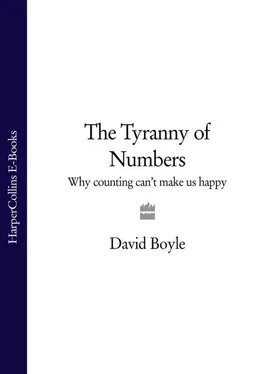To help the process along, Quetelet invented the dryest of all people – the monstrous intellectual creation, l’homme moyen or Average Man. Mr A. Man is seriously boring: he has exactly average physical attributes, an average life, an average propensity to commit crime, and an average rather unwieldy number of children – which used to be expressed as the cliché 2.4. But Average Man only exists in the statistical laboratory, measured at constant room temperature by professional men with clipboards and white coats. The whole business of relying on numbers too much goes horribly wrong simply because Mr Average is the Man Who Never Was – counted by people who know a very great deal about their profession or science but precious little about what they are counting. The Man Who Never Was measured by the Men Who Don’t Exist. It’s the first and most important paradox of the whole business of counting:
Counting paradox 1: You can count people, but you can’t count individuals
Average Man belongs to the Industrial Revolution and the Age of the Masses, but we just don’t believe most of that Marxist stuff any more. It belongs in the twentieth-century world of mass production, where people were transformed into cogs in giant machines, as pioneered by the great American industrialist Henry Ford – the man who offered his customers ‘any colour you like as long as it’s black’. Mass production and Average Man had no space for individuality. Figures reduce their complexity, but the truth is complicated.
Now, of course, you can almost have your car tailor-made. You can mass-produce jeans using robots to designs which perfectly match the peculiarities of individual bodies on the other side of the world. The days have gone when clothes issued by the military didn’t fit, when you struggled to keep up with the speed of the production line, with your tasks individually timed for Average Person by the time and motion experts. And we can see more clearly how difficult it is to categorize these widely different individuals who make up the human race. But in the hands of a bureaucratic state, people who don’t conform to the norm get hounded and imprisoned. Or, these days, social workers visit them and remove their children.
And after all that, when you get to know Mr Average, you find he has a bizarre taste in underwear, he has extraordinary dreams about flying through galaxies, and a hidden collection of Abba records. He wasn’t average at all. Counting him in with other people ignores the real picture.
Counting paradox 2: If you count the wrong thing, you go backwards
Because it is so hard to measure what is really important, governments and institutions pin down something else. They have to. But the consequences of pinning down the wrong thing are severe: all your resources will be focussed on achieving something you didn’t mean to.
Take school league tables, for example. When the Thatcher government latched onto the idea of forcing schools to compete with each other by measuring the progress of children at three comparable moments of their lives, they were intending to raise standards. They probably have done in a narrow way. The trouble was that schools concentrated on the test results to improve their position on the tables, which was anyway pretty meaningless. That meant excluding pupils who may drag down the results, concentrating on the D grade pupils – the only ones who could make a difference in exam result league tables – to the detriment of the others. It meant concentrating on subject areas the school could compete in, never mind whether they were the subjects the children needed. And worst of all, it meant squeezing the curriculum to produce children that can read and write but are, according to National Association of Head Teachers general secretary David Hart, ‘unfit philistines’.
Then there was the business of using hospital waiting lists as a way of measuring the success of the health service. Tony Blair’s new government made an ‘interim promise’, which then hung around their neck like an albatross, to reduce waiting lists by 100,000. They did push the lists down, though painfully slowly. But the result was the emergence of new secret waiting lists for people just to get in to see the hospital consultant, before they were even allowed near a real waiting list. Quick simple easy operations were also speeded up to get the numbers down, at the expense of the difficult ones. And when the hospital league tables of deaths came out in 1999, consultants warned it would make administrators shy of taking on difficult complicated cases.
Governments and pressure groups latch onto the wrong solutions and then busily measure progress towards them. They thought that shifting to diesel fuel for cars would clean up polluted air and measured progress towards achieving it. Result: air full of carcinogenic particulate matter. They thought more homework for primary school children was the solution to underachievement and measured progress towards it. Result: miserable dysfunctional kids.
It has all the makings of a fairy tale. If you choose the wrong measure, you sometimes get the opposite of what you wanted. And any measure has to be a generalization that can’t do justice to the individuals that are included.
Counting paradox 3: Numbers replace trust, but make measuring even more untrustworthy
When farmers and merchants didn’t trust each other to provide the right amount of wheat, they used the standard local barrel stuck to the wall of the town hall, which would measure the agreed local bushel. When we don’t trust our corporations, politicians or professionals now, we send in the auditors – and we break down people’s jobs into measurable units so that we can see what they are doing and check it. If doctors hide behind their professional masks, then we measure the number of deaths per number of patients, their treatment record and their success rate, and we hold them accountable. When politicians look out of control, we measure their voting records and their popularity ratings – just as the TV commentators break down a sporting performance into opportunities, misses, aces, broken services and much else besides.
It wasn’t always like that. Previous generations realized that we lose some information every time we do this – information the numbers can’t provide. They realized, like James Anyon, that we could never measure what a doctor does so well that we could do it for them. They still have experience that slips through the measurement, so we still have to accept the word of the professionals to get to the truth. The British establishment used to be quite happy to accept the word of the professionals if they were ‘trustworthy gentlemen of good character’. But from the outside, that trust looked like a cosy nepotistic conspiracy. And probably it was.
It was this kind of political problem which led to the growth of cost-benefit analysis. This was originally used by French officials to work out what tolls to charge for new bridges or railways, but it was taken up with a vengeance in twentieth-century America as a way of deciding which flood control measures to build. After their Flood Control Act of 1936, there would be no more federal money for expensive flood control measures unless the benefits outweighed the costs. Only then would the public be able to see clearly that there was no favouritism for some farmers rather than others. It was all going to be clear, objective, nonpolitical and based on counting.
Even so, the professionals clung to their mystery as long as they could, just as doctors fought the idea of scientific instruments that would make the measurements public and might lead people to question their diagnoses – the stethoscope was acceptable because they were the only ones who could listen to it. Even the US Army Corps of Engineers – in charge of the flood control analysis – tried to keep the mystery alive. ‘It is calculated according to rather a complex formula,’ a Corps official told a Senate committee in 1954. ‘I won’t worry you with the details of that formula.’ It couldn’t last. The more they were faced with angry questioning, the more their calculations had to be public.
Читать дальше












